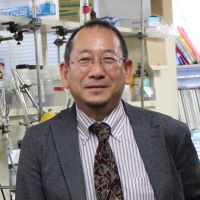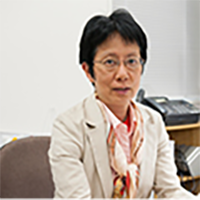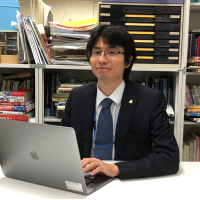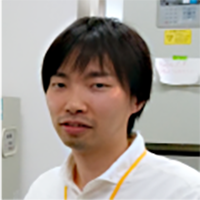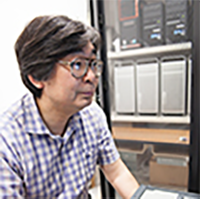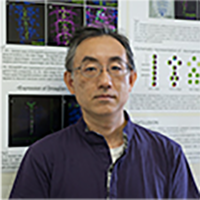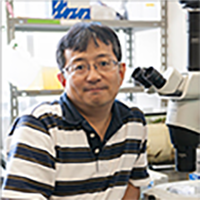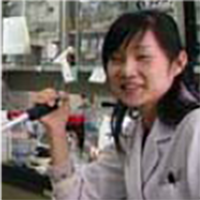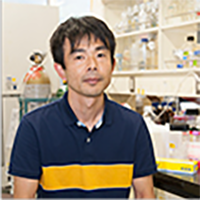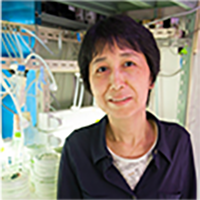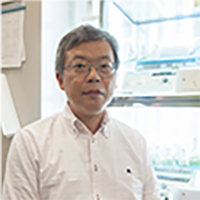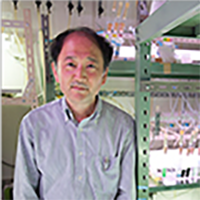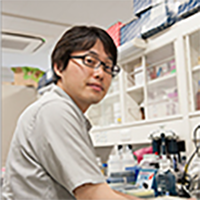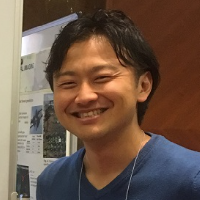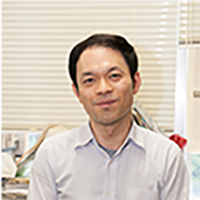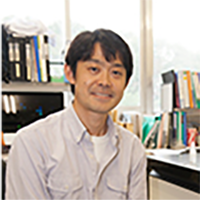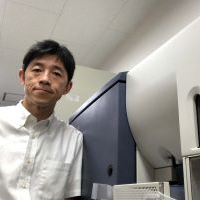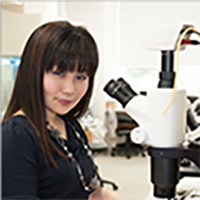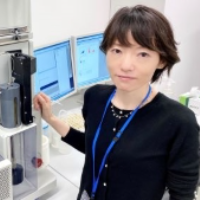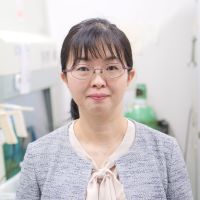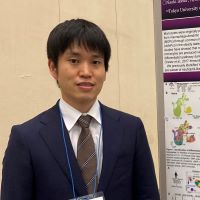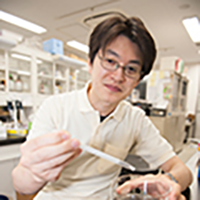学部紹介 Research:Tokyo University of Pharmacy and Life Sciences
Department of Molecular Biology
Our department studies life sciences at molecular level with experimental or theoretical approach in order to contribute to innovative development of life sciences including drug discovery and development.
Laboratory of Bioorganic Chemistry
We have been studying the following subjects regarding organic chemistry;
- Development of an efficient synthetic route to complex natural products and biologically active compounds
- Development of novel and useful synthetic methods for natural product synthesis
- Development of functional fluorescence molecules.
-
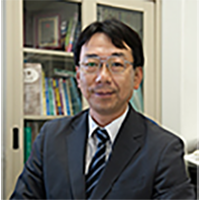 Professor
Professor
Hisanaka Ito -
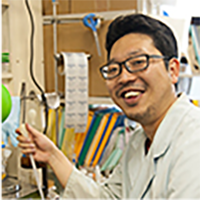 Associate professor
Associate professor
Toyoharu Kobayashi -
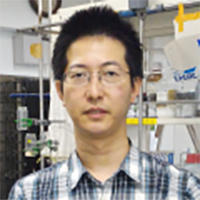 Assistant professor
Assistant professor
Yuichiro Kawamoto
Laboratory of Molecular Neuroscience and Neurology
- Neural information processing mediated by network activities inhippocampal circuitry.
- Study on dynamics of neural system underlying the behavior of Drosophila melanogaster.
- Information processing mechanisms mediated by the neural networksinvolved in chemical senses.
- Neural basis of olfaction and colorvision in Drosophila melanogaster.
-
 Professor
Professor
Junji Yamauchi -
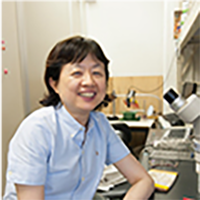 Associate professor
Associate professor
Takako Morimoto -
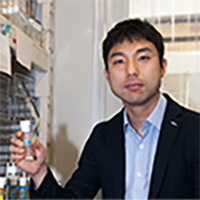 Assistant professor
Assistant professor
Yoichi Seki -
 Assistant professor
Assistant professor
Yako Hideji
Laboratory of Bioanalytical and Environmental Chemistry
The mission of our laboratory is to develop new analytical methods that can measure and/or observe directly interactions between chemical substances and living cells/organisms, and to understand molecular, cellular, individual and ecosystem-level mechanism that life respond to the chemical environmental changes. Our long-term goal is to use the knowledge gained from our research to contribute to solution of drug design or an environmental problem.
-
 Professor
Professor
Tomonari Umemura -
 Associate professor
Associate professor
Tatusya Uchida -
 Lecturer
Lecturer
Hidetoshi Kumata -
 Assistant professor
Assistant professor
Motohide Aoki
Laboratory of Bioinformatics
Main interest of our laboratory is what kind of principle governs the protein architecture and how it is related to molecular functions. We are investigating the following topics by physicochemical methods and bioinformatics:
- Application of solution X-ray scattering to construct the protein structure
- In silico drug discovery by computational chemistry and bioinformatics
- Reverse engineering of protein structures based on topological geometry
Laboratory of Medicinal Chemistry
- Creation of new functional molecules and drugs based on peptide chemistry
- Searching for natural bioactive compounds from plants.
- Redox biology using bioimaging techniques; development of fluorescent probes and analyses.
Laboratory of Computational Biophysics
We investigate the properties of soft matter (biomolecules and materials) and biological systems by computer simulations.
Our current research topics include:
- Molecular dynamics simulation of proteins related to myopathy,
and starch branching enzyme - Numerical simulation of twitching motility of bacterium
- Simulation of coarse-grained model of gel and polymers.
- Data-driven structural design of small molecule compounds
Laboratory of Cell Signaling
Our laboratory is interested in functional roles of post-translational modifications on lysine residues including acylation and methylation in various diseases such as cancer and drug discovery targeting protein lysine modifications.
- Regulation and physiological roles of novel lysine acyl-modifications of proteins and their significance in cancer.
- Exploration and development of small molecules that target lysine modifications and epigenetic modulators.
- Lysine adduct exposome by carboxylic acids derived from living environment.
Laboratory of Language Sciences
Language is a system, ability, a communication tool, and something that is common to all human beings. We are committed to study language (a language or languages), focusing on the following subfields of linguistics: socio- linguistics, pragmatics, corpus analyses, and second language acquisition.
Laboratory of Teacher Training Course
The purpose is to provide students with knowledge and experience related to theories and practice of school science education.
- the awareness of pedagogy:fundamental theories of pedagogy
- education processes and instruction methods
- student instruction,education consultation and career guidance.
Center for Comprehensive Study and Education
- Simulation study on chemotactic ability of microorganisms using with physics and informatics models
- Prescription survey on outpatients receiving long term medication/Development a continuous EBM learning and learning program for Pharmacist.
- Exploring of novel materials combined machine learning and quantum mechanics (or molecular dynamics simulation).
Department of Applied Life Science
Our department studies biotechnology, microbiology and plant science for contributing to sustainable developments, environmental protection, renewable energy, and food production.
Laboratory of Bioengineering
Laboratory of Food Science and Technology
Laborabotory of Environmental Biology
We have been engaged in the study of stress-induced molecular responses at systemic and cellular levels. Especially our interests have focused on regulation of gene expression. Also our projects have been extended toward effects of environmental endocrine disruptors on the molluscan endocrine system.
Laboratory of Plant Science
The main subject: Basic and applied molecular physiology in microalgae and cyanobacteria.
- Responses to the environmental factors such as light, CO2 and arsenate.
- Evolution of algal photosynthesis on glucan synthesis.
- Contribution of acidic lipids on the function of proteins in thylakoid membranes.
- Calcification of Coccolithophorid.
Laboratory of Bioenergy Science and Technology
Our laboratory studies microorganisms and microbial communities that are useful in bioenergy generation, pollutant degradation, and environmental protection. Current research topics include:
- Microbial fuel cells
- Anaerobic digestion and methanogenesis
- Wastewater treatment
- Microbial electrosynthesis of value-added chemicals
Laboratory of Applied Ecology
Our laboratory studies photosynthesis, respiration and water relations in terrestrial plants. Current topics are:
- Acclimation mechanisms of understory herbs to changing environment in deciduous forests.
- Interaction between photosynthesis and respiration in illuminated leaves.
- Regulatory mechanisms of flux balance between CO2 assimilation and water loss in leaves.
Life Science Research and Education Center
We are focusing on bacteriophages infecting extreme thermophiles. Current research topics include:
- Phage lytic enzymes
- Initial interaction between phage and host cell
- Phage display systems for directed evolution
Department of Medical Science
Our department studies basic medicine such as cancer, neuroscience, immunology, circulation research, and regenerative medicine. We aim to develop drugs and diagnostic agents based on pathogenic mechanism of diverse diseases.
Laboratory of Computational Genomics
We have started as a new laboratory to promote research with a focus on data science. Through data analysis of biological information such as genome sequences and comprehensive transcripts, we aim to elucidate the pathogenic mechanisms of diseases and apply them to clinical practice.
- Understanding human diseases through integrated analysis of genetic and environmental factors and its application to preventive medicine
- Researches for predicting disease-causing mechanisms of human genetic disorders and exploring therapeutic drug targets based on molecular information with machine learning approaches
- Elucidation of molecular mechanism of cancer drug resistance or skin diseases to develop molecular-targeted drugs
- Elucidation of novel molecular mechanisms on adhesion, migration and cannibalism of cancer cells
-
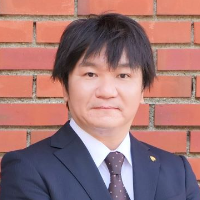 Professor
Professor
Kazuyoshi Hosomichi -
 Associate professor
Associate professor
Atsushi Hijikata -
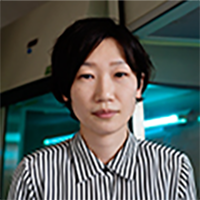 Lecturer
Lecturer
Reiko Sato -
 Lecturer
Lecturer
Atsuko Yoneda
Laboratory of Regenerative Medicine
Our Mission
We aim to bridge basic research and clinical medicine by developing new technologies to generate human organs and applying them to disease treatment and basic research.
Our Projects
- Establishment a new technology for the generation of human organs from pluripotent stem cells using animal developmental processes.
- Elucidation of the nature and novel treatment methods for psychiatric disorders.
- Understanding the functions of mitochondria and inter-organelle contacts in organ development and disease.
-
 Professor
Professor
Tomoyuki Yamaguchi -
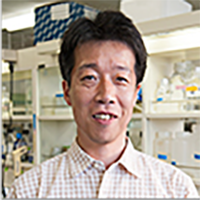 Lecturer
Lecturer
Toshifumi Fukuda -
 Lecturer
Lecturer
Shun Nagashima -
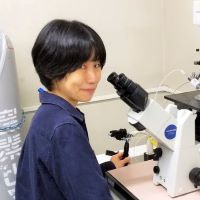 Assistant professor
Assistant professor
Mami Oikawa
Laboratory of Infection Control and Prevention
Newly synthesized secretory/membrane proteins are transported to their target organelles via transport vesicles. This transport system, named vesicular transport, is required cell survival, division, and differentiation. The goal of our laboratory is to understand the molecular mechanisms of membrane fusion and organelle organization.
Laboratory of Stem Cell Regulation
Stem cell system continuously supplies various types of functioning cells on demand throughout life. Vascular system facilitates transport of essentials and wastes throughout entire body. Both systems are critical for maintaining homeostasis and are involved in wide variety of diseases such as cancers, inflammation and infections. We are investigating the molecular and cellular mechanisms which regulates these systems under physiological and pathological conditions and developing novel therapeutic and prophylactic strategies.
Laboratory of Oncology
Our laboratory is interested in the molecular mechanisms of hematological malignancies, including acute myeloid leukemia and myelodysplastic syndromes (MDS), especially with a specific focus on the role of RUNX1 mutations in MDS. We utilize the gene analysis of patient samples and mouse models to understand the role of the gene alterations to the pathogenesis of MDS. The goal of our studies is to provide novel therapies to patients with MDS.
Laboratory of Immune Regulation
Macrophages and dendritic cells recognize not only microorganisms from outside of the body,but also dying self-cells to eliminate them by engulfment. This clearance prevents the release of potentially harmful or immunogenic intracellularmaterials from dying cells. Our laboratory is investigating the molecularmechanisms for recognition and phagocytosis of dying cells by phagocytes, andthe pathological relevance of impaired phagocytosis to inflammatory disordersincluding autoimmune diseases.
Laboratory of Cellular Defense Medical Science
It has become evident that non-immune cells are capable of recognizing and eliminating various dysfunctional and diseased cells, such as suboptimal cells with cancer mutations, bacteria, and virus-infected cells. However, the process of recognizing these transformed cells and triggering the elimination response remained unclear. Professor Maruyama has made ...
- a significant breakthrough by identifying a new protein named "Suboptimal Alteration Recognizing Protein" (AltR) on normal cells.
- AltR has the ability to recognize Major Histocompatibility Complex I (MHC-I).
This discovery is groundbreaking because it challenges the conventional wisdom that MHC-I recognition is the exclusive domain of immune professional cells. The existence of similar surveillance mechanisms in non-immune epithelial cells is a paradigm shift in our understanding.
Life Science Research and Education Center
We are studying the regulatory mechanisms of DNA replication under replication stress that is caused by various endogenous and exogenous agents such as UV and reactive oxygen spieces.
- Stabilization of stalled replication forks under replication stress
- Regulation of assembly and disassembly of the replisome complex




